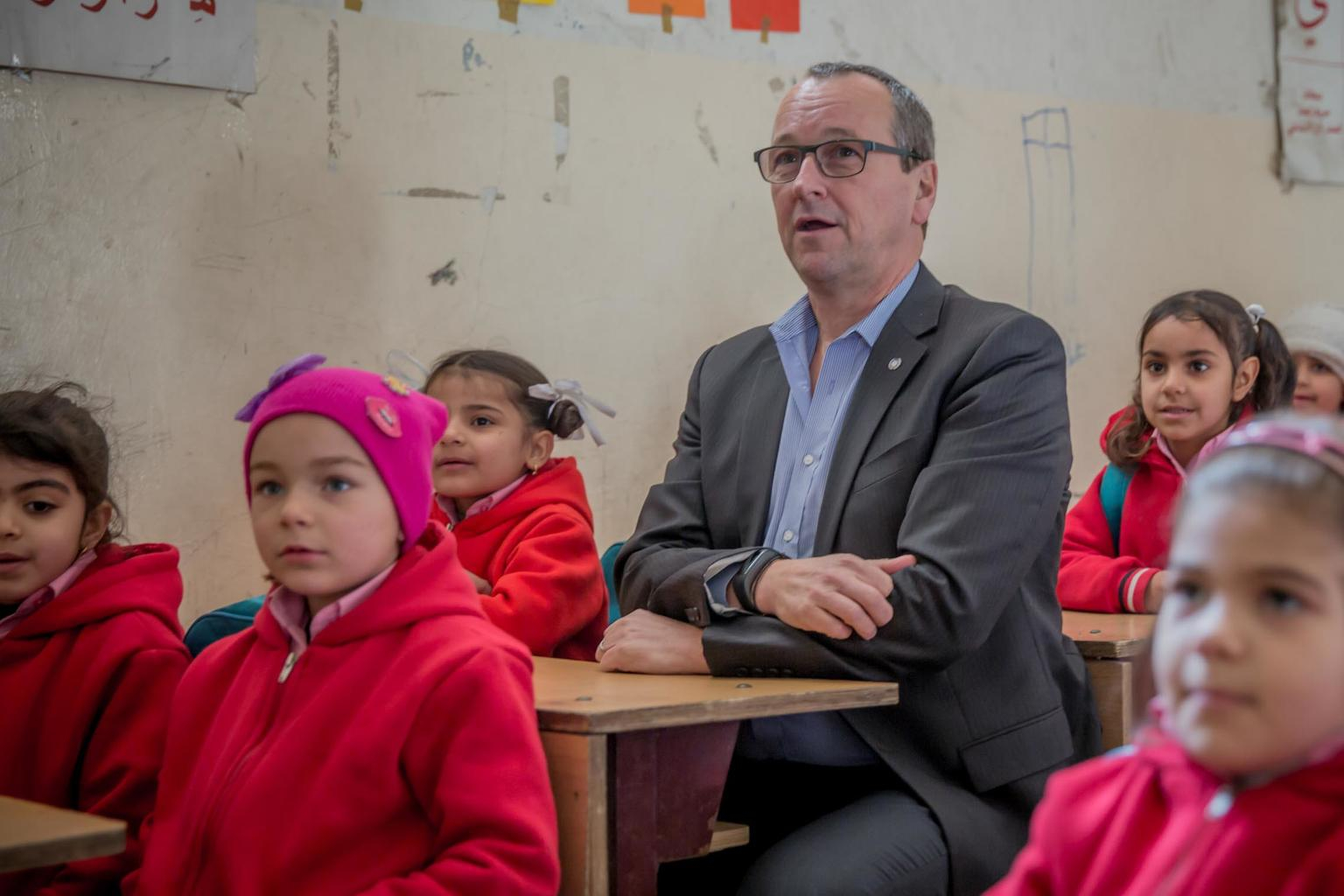At least one in four children in Iraq impacted by conflict and poverty
2018-01-19
© UNICEF/Anmar
UNICEF Regional Director for the Middle East and North Africa Geert Cappalaere with children at Al-Sanadeed school for girls in East Mosul.
Statement by UNICEF Regional Director, Geert Cappelaere, following his visit to Iraq.
BAGHDAD/AMMAN/HONG KONG, 19 January 2018 – “Iraq today hosts one of UNICEF’s largest operations in the world, responding with humanitarian and development assistance to the needs of the most vulnerable girls and boys across the country.
“More than 4 million children have been impacted by extreme violence in several areas including in Ninewa and al-Anbar. Last year alone, 270 children were killed. Many were robbed of their childhood, forced to fight on the frontlines. Some will bear the physical and psychological scars for life due to exposure to unprecedented utality. Over 1 million children were forced to leave their homes.
“While the fighting has come to an end in several areas, spikes of violence continue in others. Just this week, three bombings went off in Baghdad. Violence is not only killing and maiming children; it is destroying schools, hospitals, homes and roads. It is tearing apart the diverse social faic and the culture of tolerance that hold communities together.
“In the northern city of Mosul, a place that witnessed unspeakable destruction, I met children who were hit hard by three years of violence. In one of the schools that UNICEF recently rehabilitated in the western parts of Mosul, I joined 12-year-old Noor in class. She told me how her family stayed in the city even during the peak of the fighting. She spoke of her fear when she was taking shelter. She lost three years of schooling and is now working hard to catch up, learning English with other boys and girls.
“Mankind may have proven once again in Mosul and other parts of Iraq its massive power to destroy and destruct. But another much stronger power left a deeper impression: the determination to rebuild and get on with life. Children were so excited speaking of their aspirations, sharing their happiness of being able to play and study again.
“I met with Samir, a displaced retired teacher who survived the heavy fighting. Full of hope and life, he spoke of children’s boundless power to heal and overcome the devastation of war through school and through play. Samir is a testament that there should be no lost generation in Iraq.
“Poverty and conflict have interrupted the education for 3 million children across Iraq. Some have never been inside a classroom. Over a quarter of all children in Iraq live in poverty, with children in southern and rural areas most affected over the past decades.
“As Iraq prepares for elections and the International Summit for Iraq, there is no better moment to prioritize the interests of children, stop the violence and eak the cycle of poverty and deprivation.
“On behalf of Noor and Samir and millions of children and caregivers, UNICEF appeals to authorities in Iraq and the international community to:
• Put an end to all forms of violence everywhere in the country so that children and families in Iraq can live in safety and dignity, protected from harm. • Continue providing humanitarian and recovery assistance like safe water, education, protection and psycho-social support, nutrition and health services to the most affected children, including those who remain in camps and informal settlements. • Massively step up immediate and long-term investments in education. The children of Iraq, like all children around, the world have the right to learn and aspire to a better tomorrow. The children of today are tomorrow’s teachers, doctors, engineers and scientists. Investing in them now is an investment in Iraq’s future.
“The International Summit for Iraq, hosted by the State of Kuwait from 12-14 Feuary is another unique opportunity for the Government of Iraq and the international community to further strengthen commitments towards children in Iraq. The strongest of which is not through another plan but the commitment to increase budgets allocated to support children inging a positive impact on the lives of children.
“Member states and the private sector should turn financial pledges into concrete commitments for children. This is fundamental for rebuilding a peaceful and prosperous Iraq away from the vicious cycles of violence and intergenerational poverty.
“UNICEF and partners will continue standing firm with the girls and boys of Iraq to ensure respect for and fulfilment of their rights agreed in the Convention on the Rights of the Child and in humanitarian law.”










